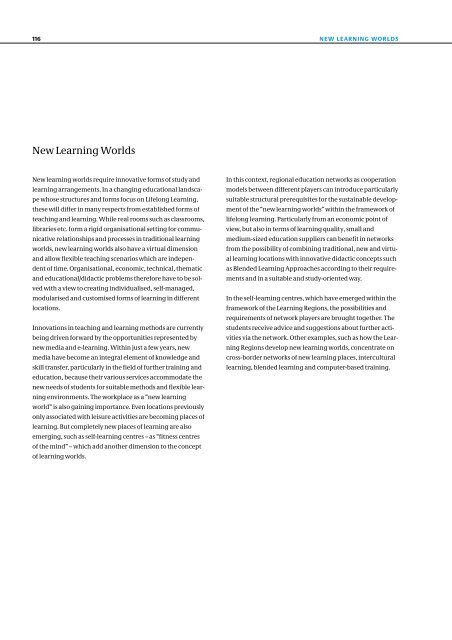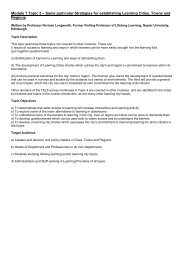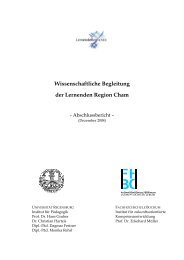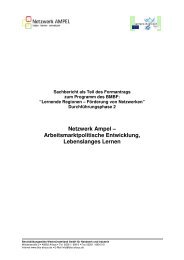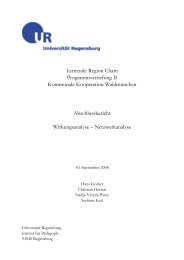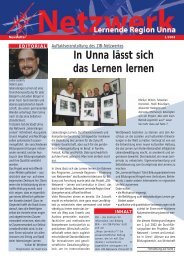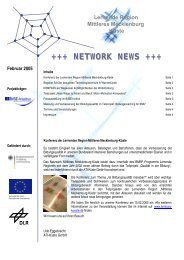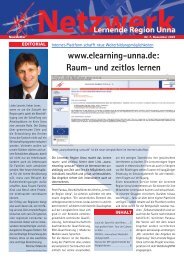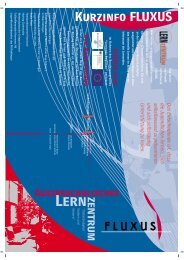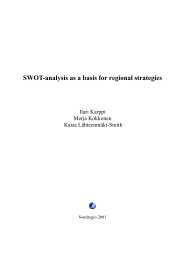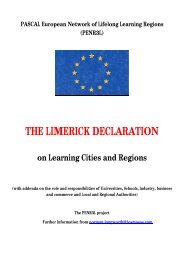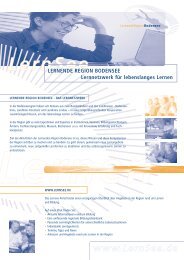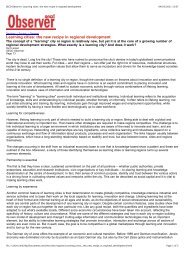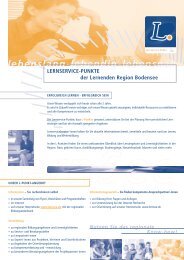Die Strategie für das Lebenslange Lernen ... - EUROlocal
Die Strategie für das Lebenslange Lernen ... - EUROlocal
Die Strategie für das Lebenslange Lernen ... - EUROlocal
Sie wollen auch ein ePaper? Erhöhen Sie die Reichweite Ihrer Titel.
YUMPU macht aus Druck-PDFs automatisch weboptimierte ePaper, die Google liebt.
116 NEW LEARNING WORLDS<br />
New Learning Worlds<br />
New learning worlds require innovative forms of study and<br />
learning arrangements. In a changing educational landscape<br />
whose structures and forms focus on Lifelong Learning,<br />
these will differ in many respects from established forms of<br />
teaching and learning. While real rooms such as classrooms,<br />
libraries etc. form a rigid organisational setting for communicative<br />
relationships and processes in traditional learning<br />
worlds, new learning worlds also have a virtual dimension<br />
and allow flexible teaching scenarios which are independent<br />
of time. Organisational, economic, technical, thematic<br />
and educational/didactic problems therefore have to be solved<br />
with a view to creating individualised, self-managed,<br />
modularised and customised forms of learning in different<br />
locations.<br />
Innovations in teaching and learning methods are currently<br />
being driven forward by the opportunities represented by<br />
new media and e-learning. Within just a few years, new<br />
media have become an integral element of knowledge and<br />
skill transfer, particularly in the field of further training and<br />
education, because their various services accommodate the<br />
new needs of students for suitable methods and flexible learning<br />
environments. The workplace as a “new learning<br />
world” is also gaining importance. Even locations previously<br />
only associated with leisure activities are becoming places of<br />
learning. But completely new places of learning are also<br />
emerging, such as self-learning centres – as “fitness centres<br />
of the mind” – which add another dimension to the concept<br />
of learning worlds.<br />
In this context, regional education networks as cooperation<br />
models between different players can introduce particularly<br />
suitable structural prerequisites for the sustainable development<br />
of the “new learning worlds” within the framework of<br />
lifelong learning. Particularly from an economic point of<br />
view, but also in terms of learning quality, small and<br />
medium-sized education suppliers can benefit in networks<br />
from the possibility of combining traditional, new and virtual<br />
learning locations with innovative didactic concepts such<br />
as Blended Learning Approaches according to their requirements<br />
and in a suitable and study-oriented way.<br />
In the self-learning centres, which have emerged within the<br />
framework of the Learning Regions, the possibilities and<br />
requirements of network players are brought together. The<br />
students receive advice and suggestions about further activities<br />
via the network. Other examples, such as how the Learning<br />
Regions develop new learning worlds, concentrate on<br />
cross-border networks of new learning places, intercultural<br />
learning, blended learning and computer-based training.


